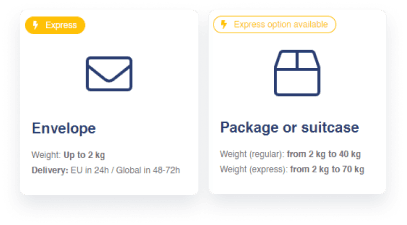Moving to Indonesia: Things you should know before you immigrate to Indonesia

THE BASICS
Things to know about living in Indonesia
Jakarta
UTC+7 to UTC+9
Indonesian rupiah (IDR)
260 million
Indonesian
+62
112
On the left side
BEFORE MOVING
The cost of moving to Indonesia. International removals to Indonesia with Eurosender
With Eurosender, you can take advantage of affordable shipping services for expats with lower than the average cost of moving to Indonesia.
Visa regulations for Indonesia
Getting a visa in Indonesia can be a long and complicated process. Below we describe the basics of the Indonesian visa system. However, we recommend you to contact the local Indonesian embassy for the latest visa regulations. Check the visa types for Indonesia:
- Tourist Visa: People can get this visa upon arrival for 30 days. The tourist visa can be extended for another 30 days at the local immigration office. With a tourist visa, you are not allowed to work, even when this is voluntary work.
- Visit visa: This is what you could consider a business visa and is valid for up to 60 days. It can be used for business visits.
- Temporary residence: For this, you need to get what is called VITAS (Visa Izin Tinggal Terbatas) in Indonesian. This semi-resident visa allows you to stay up to 1 year in Indonesia with the possibility to extend that stay for another year. Once you have that, you can apply for KITAS, which is a temporary residency permit, which is valid for up to 5 years.
- Permanent residence: After living in Indonesia for 3 years, you can apply for permanent residency, which is called KITAP.

Send my documents express
Property information. Real estate market in Indonesia
With a vast range of different options on the real estate market, Indonesia has accommodation for each budget. The cost of living and renting apartments in Indonesia depends on the neighbourhood and the type of living facility. The average cost of a 1-bedroom apartment in the city centre is €240. If you are moving to Indonesia with family, a 3-bedroom apartment will cost about €670 in the city centre and €380 in the suburbs.
If you plan to buy a house in Indonesia, be ready to pay €1,800 per square meter in Jakarta and almost €1,500 in Surabaya.
Get a quote for relocating to Indonesia
LIVING IN INDONESIA
The cost of living in Indonesia
You will find that the cost of living in Indonesia is low if you are immigrating from EU countries or the United States. The accommodation cost will take up the biggest part of your budget, especially if you rent an apartment in the city centre of Jakarta or any other big city. However, food products are relatively cheap. Fuel prices and utility bills also compare favourably well to most western countries.
If you are relocating to Indonesia alone, for work or study, the average cost of living is about €700 per month. For expats moving to Indonesia with a family, the monthly living cost is about €1,400.
Do you need to send documents urgently to Indonesia to help secure a place to stay before moving?

Eurosender offers fast envelope delivery with our Express delivery service.
The job market in Indonesia
When you are looking for a job in Indonesia, these are some of the most popular areas for English speaking foreigners coming to the country.
- Teaching: In most cases, people teach English in Indonesia, but you can also teach other subjects at a private or international school.
- Multinationals: When you already work for a multinational, it might be possible to be relocated to Indonesia.
- Export: With many products that are being exported from Indonesia, here is always a need for skilled workers.
School and education in Indonesia
There are three types of schools in Indonesia you can choose from when immigrating with children:
- Public schools are free of charge and organised by the local government. When you are moving to Indonesia with children, keep in mind that the classes are held in Indonesian.
- Private schools have a broader curriculum and education, and also offer classes in English. Private schools are a cheaper option compared to international schools.
- International schools: With an international curriculum, this option is the most common one chosen by foreigners who relocated to Indonesia with a family.
Age: 3-6
Compulsory: No
Age: 6-12
Compulsory: Yes
Age: 12-18
Compulsory: Yes
Healthcare in Indonesia
Healthcare system in Indonesia is not always up to western standards, and it might be hard to find proper medical care in some areas. Public healthcare is not always of decent quality. That is why most expats living in Indonesia prefer private medical care. Also, keep in mind that Indonesians themselves are covered by the universal healthcare system, but foreigners are not. When visiting a private clinic, make sure to bring some cash as payment by a card is often not possible.
When moving to Indonesia, always contact your physician to see if you need any vaccinations and mention the exact location of where you are going. While in urban areas the conditions are usually safe, in rural areas there might be a chance to contract malaria or other diseases.
Driving in Indonesia
Driving in Indonesia might differ a bit from your native country. Check some of the driving rules and tips about driving in Indonesia.
- Whether you want to bring your car or rent one, you should always have your native driving licence, International Driving Permit (IDP), insurance document and registration document of the vehicle with you.
- Indonesian traffic is overwhelming and dangerous. Drivers are flexible with traffic laws, and road conditions can be rather poor. Therefore, many expats and foreigners living in Indonesia choose to hire a driver.
- Due to the rainy seasons, many roads are flooded.
- Indonesians don’t like red traffic lights and behave impatiently around them or even completely ignore them.
- Motorcycles are a popular form of transport in Indonesia. However, they tend to make up their own rules and often cause dangerous situations for people driving other vehicles.

Send urgent documents
What else to expect when living in Indonesia as an expat
- There are substantial income gaps between certain parts of the population, with many people living in Indonesia in poverty.
- Traffic is one of the worst in the world and is also one of the causes of air pollution, which is widespread in urban areas.
- When moving to Indonesia, be prepared that punctuality is not something that is often adhered to locals. Don’t be surprised when your guests or business partners show up an hour late.
- Expats immigrating to Indonesia admit a vibrant nightlife with karaoke, live bands and discos.
- Food is cheap and Indonesian cuisine offers a wide range of flavours, so there is something for everyone to like.
- Alcohol is allowed but is not to be sold to Muslims.
Relocate to Indonesia with Eurosender

MOVING DESTINATIONS
See the most popular destination from where people move to Indonesia
Moving to Indonesia from the UK
Foreigners who plan to immigrate to Indonesia from the United Kingdom, benefit from affordable solutions to move their personal belongings, furniture, and household goods with Eurosender. Thus, you will save time and money when moving to Indonesia from Germany. With the help of our platform, you get immediate quotes and can make a simulation of the average moving costs to Indonesia.
Moving to Indonesia from the USA
When you have secured a job and found a place to live, you may be stuck with the question: How much is shipping from the USA to Indonesia? Eurosender offers effective solutions when relocating to Indonesia from the United States. Whether you want to ship just a few boxes or move the entire house, choose the international removals options to Indonesia provided by Eurosender.
Moving to Indonesia from Canada
International courier services powered by Eurosender are the best option for moving to Indonesia from Canada. If your items are bulky or oddly shaped, you can send us a request, and we will prepare a tailored offer based on your needs. Get the best rate and save the cost of moving to Indonesia with international removals by Eurosender.


